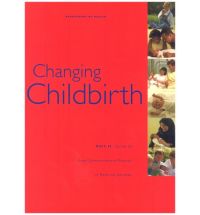Twenty years after the publication of Changing Childbirth, an eminent panel of clinicians, politicians and consumer representatives assembled to review the legacy of this key  maternity report. The session, funded by the Wellcome Trust, was held at the Royal College of Obstetricians and Gynaecologists in London – an appropriate place given the balance of power at the time of the report. BU Professors Vanora Hundley and Edwin van Teijlingen were invited to attend as part of the selected audience at the session.
maternity report. The session, funded by the Wellcome Trust, was held at the Royal College of Obstetricians and Gynaecologists in London – an appropriate place given the balance of power at the time of the report. BU Professors Vanora Hundley and Edwin van Teijlingen were invited to attend as part of the selected audience at the session.
The session started with the panel reminding the audience that maternity services prior to the publication of Changing Childbirth in the early 1990s were anything but women focused. Several speakers noted that this report was the first to put women at the centre of maternity care, and many of the recommendations regarding patient-centred care across the NHS followed on from it. As the president of the Royal College of Midwives (RCM) Lesley Page commented: “It was common sense, but hugely radical.”
 Changing Childbirth was the government’s response to Sir Nicholas Winterton’s ground-breaking review of the maternity services (Health Select Committee report 1992). The review was unique in seeking views from women – as Nicholas Winterton noted, his Parliamentary committee also made history by letting women who came to give evidence breastfeed during the hearing.
Changing Childbirth was the government’s response to Sir Nicholas Winterton’s ground-breaking review of the maternity services (Health Select Committee report 1992). The review was unique in seeking views from women – as Nicholas Winterton noted, his Parliamentary committee also made history by letting women who came to give evidence breastfeed during the hearing.
Baroness Julia Cumberlege reflected on how she had been determined that the Health Select Committee report would not simply be another filed document but would have an impact. Twenty years on has the report had an impact?
The discussions covered a wide-ranging number of maternity care issues at the time of Changing Childbirth’s conception, many of which are still issues today in the UK. We’d like to highlight two of these issues where BU has made an academic contribution. First, the observation that we need to be cautious in making assumptions about choices that women perceive they have in childbirth. Profs van Teijlingen and Hundley’s research has demonstrated that women often cannot envisage or value potential choices if these options don’t exist in their current environment.1,2
The second BU contribution to the debate is around the closure of small maternity units. One of the panel members compared the centralisation of maternity services to that of banks and supermarkets. A comparative study was published in 2010 by Prof. van Teijlingen and BU Visiting Fellow Dr. Emma Pitchforth under the title ‘Rural maternity care: Can we learn from Wal-Mart?’.
Overall the panel was positive about the legacy of Changing Childbirth – that is, a more humanised maternity services. However, all present expressed disappointment at the failure of the NHS to introduce continuity of carer, something that women who gave evidence stated they valued highly. As Nicholas Winterton said: “We have made progress but we should be making further progress – It is unfinished business.”
Vanora Hundley is Professor of Midwifery
Edwin van Teijlingen is Professor of Reproductive Health Research
References:
- Hundley V, Ryan M and Graham W (2001) Assessing women’s preferences for intrapartum care. Birth 28 (4): 254-263.
- van Teijlingen E, Hundley V, Rennie AM, Graham W, Fitzmaurice A. (2003) Maternity satisfaction studies and their limitations: “What is, must still be best”, Birth 30: 75-82.
- van Teijlingen ER and Pitchforth E. (2010) Rural maternity care: Can we learn from Wal-Mart? Health & Place 16: 359-364.
 CMMPH disability & childbirth research
CMMPH disability & childbirth research










 Nursing Research REF Impact in Nepal
Nursing Research REF Impact in Nepal Fourth INRC Symposium: From Clinical Applications to Neuro-Inspired Computation
Fourth INRC Symposium: From Clinical Applications to Neuro-Inspired Computation ESRC Festival of Social Science 2025 – Reflecting back and looking ahead to 2026
ESRC Festival of Social Science 2025 – Reflecting back and looking ahead to 2026 3C Event: Research Culture, Community & Cookies – Tuesday 13 January 10-11am
3C Event: Research Culture, Community & Cookies – Tuesday 13 January 10-11am Dr. Chloe Casey on Sky News
Dr. Chloe Casey on Sky News ECR Funding Open Call: Research Culture & Community Grant – Application Deadline Friday 12 December
ECR Funding Open Call: Research Culture & Community Grant – Application Deadline Friday 12 December MSCA Postdoctoral Fellowships 2025 Call
MSCA Postdoctoral Fellowships 2025 Call ERC Advanced Grant 2025 Webinar
ERC Advanced Grant 2025 Webinar Horizon Europe Work Programme 2025 Published
Horizon Europe Work Programme 2025 Published Update on UKRO services
Update on UKRO services European research project exploring use of ‘virtual twins’ to better manage metabolic associated fatty liver disease
European research project exploring use of ‘virtual twins’ to better manage metabolic associated fatty liver disease